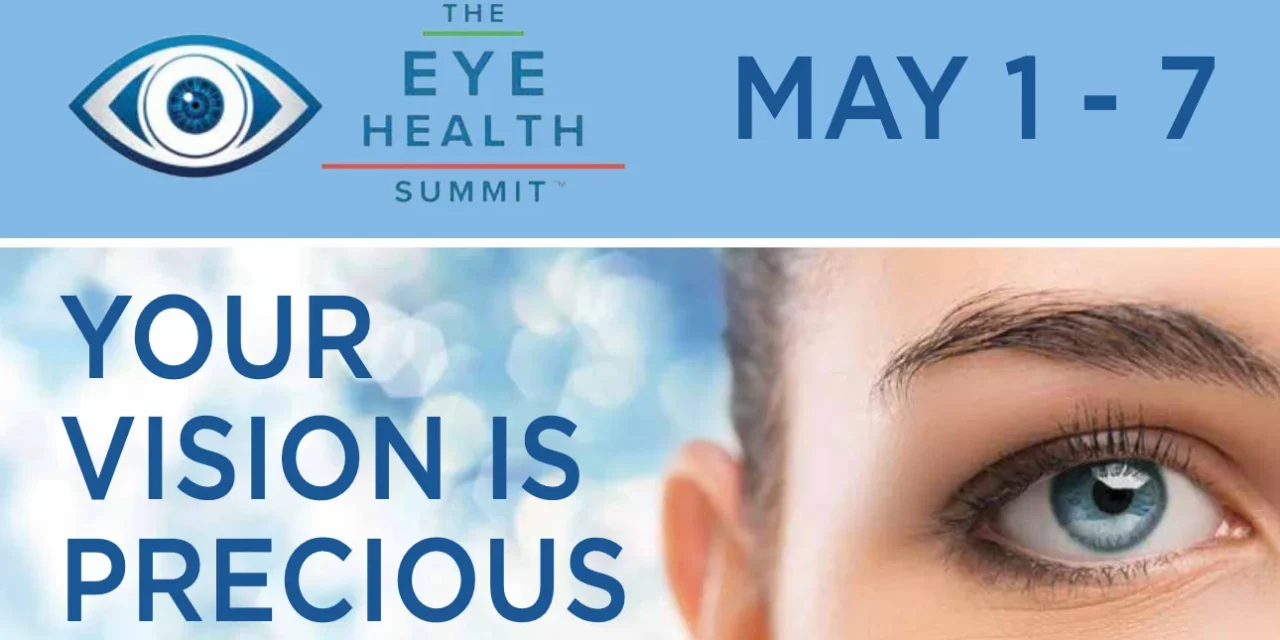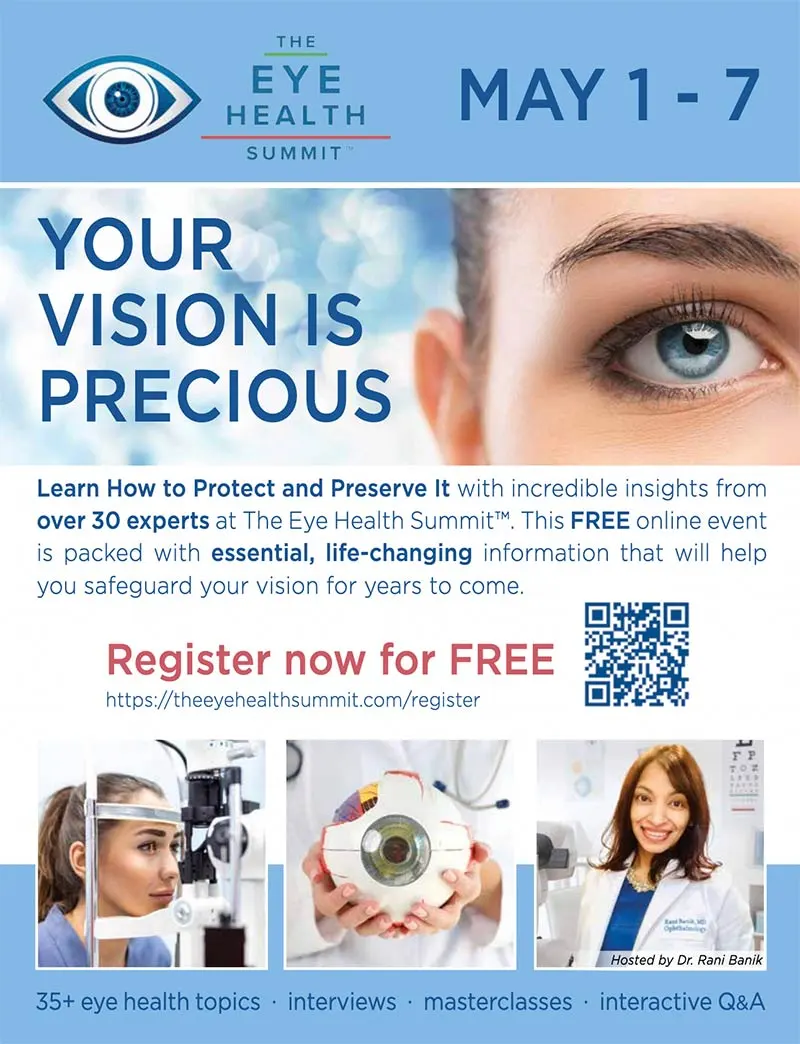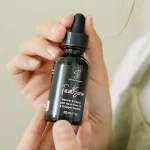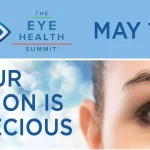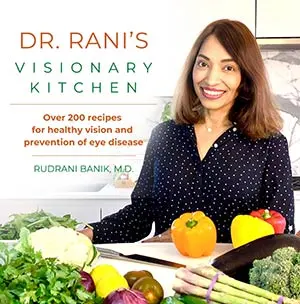 When it comes to eating for better eye health, carrots have long stolen the spotlight, and for good reason. They’re packed with nutrients that can help combat dry eye and support vision. However, relying only on carrots for optimal eye health is a misconception. Protecting your eyes requires a diverse range of nutrients that work together to defend against oxidative stress, inflammation, and the daily strain our eyes endure, especially in today’s digital age, where screens and blue light exposure are an unavoidable part of life.
When it comes to eating for better eye health, carrots have long stolen the spotlight, and for good reason. They’re packed with nutrients that can help combat dry eye and support vision. However, relying only on carrots for optimal eye health is a misconception. Protecting your eyes requires a diverse range of nutrients that work together to defend against oxidative stress, inflammation, and the daily strain our eyes endure, especially in today’s digital age, where screens and blue light exposure are an unavoidable part of life.
According to the World Health Organization (WHO), an estimated 2.2 billion people globally suffer from some form of vision impairment. More importantly, in more than 1 billion of these cases, the vision loss is preventable.i In the United States, the Centers for Disease Control (CDC) reports there are nearly 20 million people affected by age-related macular degeneration (AMD)ii and around 3 million who have glaucoma, both of which can lead to irreversible vision loss.iii Due to the expected age of living being on the rise, the risk of developing cataracts and glaucoma is increasing in parallel. All these factors emphasize the importance of greater awareness, early detection, and preventative measures for your eye health, which can be accomplished through nutrition.
The Skinny on Carrots
Carrots are rich in beta-carotene, a natural orange-red pigment found in many fruits and vegetables, which is a great addition to a diet to support your vision health. Though, that is just one small piece of the picture. Since our eyes are such complex organs, they require a combination of more than 30 different nutrients to keep these complex and intricate parts functioning to their full potential.
The key nutrient classes for eye health are lutein, zeaxanthin, omega-3 fatty acids, and bioflavonoids. These all play essential roles in keeping your eyes healthy by protecting against oxidative stress and reducing inflammation, which are two major contributors to eye conditions like dry eyes, cataracts, AMD, and glaucoma.
The Strength of Macular Carotenoids
The macular carotenoids – lutein, zeaxanthin, and meso-zeaxanthin – are powerful antioxidants found in the center of the retina; the area of the eye responsible for our central vision. These nutrients protect the retina from oxidative stress which can be caused by harmful blue light from both digital screens and even sunlight. Lutein and zeaxanthin are known to enhance the macular pigment optical density in your eye, and are basically natural, internal blue light blockers found in our retinasiv. Studies have shown that these pigments help protect against macular degenerationv, enhance visual performance, improve night vision, and reduce glare, so taking nutrients that improve this can be effective in protecting your eye health.
The body cannot produce more of these carotenoids on its own, so they must be obtained from food sources such as leafy greens (like spinach and kale), corn, egg yolks, and brightly colored vegetables like orange and yellow bell peppers. It has been shown that supplementing with these antioxidants, lutein and zeaxanthin, can significantly improve visual function and reduce the risk of developing AMD.
Omega-3 Fatty Acids for Eyes
Another crucial nutrient for eye health is omega-3 fatty acids, particularly eicosapentaenoic acid (EPA) and docosahexaenoic acid (DHA). DHA is a structural component of retinal cells and is essential for healthy brain function and vision. Omega-3 fatty acids also play a vital role in reducing inflammation, which is a major factor in dry eye disease, AMD, and diabetic retinopathy.
It is shown that increasing your intake of omega-3 fatty acids can help improve tear production and alleviate the symptoms of dry eye.vi Omega-3s also supports blood flow to the retina, which is crucial for overall visual function. Fatty fish, like salmon, mackerel, and sardines are excellent sources of omega-3s, but if you prefer plant-based options then flaxseeds, chia seeds, and walnuts are great alternatives. For those who do not get enough omega-3s through their diet alone then fish oil or algae-based DHA supplements can provide additional support.
Bioflavonoids: Nature’s Eye Protectors
Bioflavonoids are plant-based compounds with antioxidant and anti-inflammatory properties. These compounds are key for protecting the eyes from oxidative damage.vii Some bioflavonoids, such as quercetin, resveratrol, and citrus bioflavonoids (found in oranges, lemons, and grapefruits), strengthen blood vessels, improve circulation in the eyes, and help prevent conditions like diabetic retinopathy. Anthocyanidins, a type of bioflavonoid found in dark berries like blueberries and black currants, have been shown to enhance night vision, reduce eye fatigue, and protect the retina from oxidative stress. Curcumin, the active compound found in turmeric, also has anti-inflammatory effects that can alleviate symptoms of dry eye disease and other inflammatory eye conditions.
Getting These Nutrients in Your Diet
While carrots may have earned their place in the eye-health conversation, they are just one piece of a huge puzzle. Protecting your vision requires a combination of nutrients that go beyond beta-carotene and beyond just carrots. Lutein, zeaxanthin, omega-3 fatty acids, and bioflavonoids are some essential nutrients for maintaining healthy eyes and preventing vision loss.
The best way to support your eye health is by eating a nutrient-dense, balanced diet by trying to include a variety of colorful fruits and vegetables in your meals. As mentioned, leafy greens, citrus fruits, fatty fish, and nuts provide natural sources of these essential nutrients, which are needed to get your eyes to optimal health. However, with modern diets, it is not always possible to get enough of these nutrients from food alone, which is where supplements can play a helpful role in obtaining those. For instance, supplementing with lutein (10-20 mg per day) and zeaxanthin (1-2 mg per day) can improve visual performance and reduce the risk of AMD.viii Similarly, omega-3 supplements can alleviate symptoms of dry eye disease and promote retinal health, especially for individuals who do not consume enough fatty fish in their normal diet.
Protect Your Vision Starting Today
Vision problems can affect everyone — from infants to older adults — and while some issues, like digital eye strain or dry eyes, may seem minor, others, such as cataracts, glaucoma, or AMD, can have a lasting impact. Yes, vision decline is a natural part of aging, but many eye conditions can be prevented or delayed with proper nutrition and healthy lifestyle choices. That’s why education about eye health is crucial.
As a doctor, I’ve seen firsthand how devastating vision loss can be, and how often it could have been prevented. Taking care of your eyes isn’t something to put off until problems arise. By the time symptoms show up, the damage may already be done. The good news is that you have the power to take control of your eye health now. Small changes, like incorporating key nutrients and supplements into your diet can make a significant difference in preserving your vision for years to come.
That’s why I’ve brought together leading experts from around the nation for The Eye Health Summit — a global event dedicated to sharing the latest insights and strategies for lifelong eye health. Whether you’re looking to prevent future vision-threatening issues or manage existing eye conditions, this summit will give you the knowledge and tools you need to protect your sight. Don’t wait for a wake-up call. Your vision is worth fighting for, and the time to start is today.
References:
i World Health Organization. 2023. “Blindness and Vision Impairment.” World Health Organization. August 10, 2023. https://www.who.int/news-room/fact-sheets/detail/blindness-and-visual-impairment.
ii CDC. 2024. “Age-Related Macular Degeneration (AMD).” Vision and Eye Health Surveillance System. May 24, 2024. https://www.cdc.gov/vision-health-data/case-definitions/age-related-macular-degeneration-amd.html.
iii CDC. 2024. “Current Glaucoma Programs.” Vision and Eye Health. May 21, 2024. https://www.cdc.gov/vision-health/php/glaucoma-programs/index.html.
iv Ma L, Liu R, Du JH, Liu T, Wu SS, Liu XH. Lutein, Zeaxanthin and Meso-zeaxanthin Supplementation Associated with Macular Pigment Optical Density. Nutrients. 2016 Jul 12;8(7):426. doi: 10.3390/nu8070426. PMID: 27420092; PMCID: PMC4963902.
v Age-Related Eye Disease Study 2 Research Group. Lutein + zeaxanthin and omega-3 fatty acids for age-related macular degeneration: the Age-Related Eye Disease Study 2 (AREDS2) randomized clinical trial. JAMA. 2013 May 15;309(19):2005-15. doi: 10.1001/jama.2013.4997. Erratum in: JAMA. 2013 Jul 10;310(2):208. PMID: 23644932.
vi Wang WX, Ko ML. Efficacy of Omega-3 Intake in Managing Dry Eye Disease: A Systematic Review and Meta-Analysis of Randomized Controlled Trials. J Clin Med. 2023 Nov 10;12(22):7026. doi: 10.3390/jcm12227026. PMID: 38002640; PMCID: PMC10672334.
vii Majumdar S, Srirangam R. Potential of the bioflavonoids in the prevention/treatment of ocular disorders. J Pharm Pharmacol. 2010 Aug;62(8):951-65. doi: 10.1211/jpp.62.08.0001. PMID: 20663029; PMCID: PMC4372466.
viii Seddon JM, De D, Rosner B. The role of nutritional factors in transitioning between early, mid, and late stages of age-related macular degeneration: prospective longitudinal analysis. Am J Clin Nutr. 2024 Dec;120(6):1387-1398. doi: 10.1016/j.ajcnut.2024.08.019. Epub 2024 Aug 23. PMID: 39181206; PMCID: PMC11619796.

